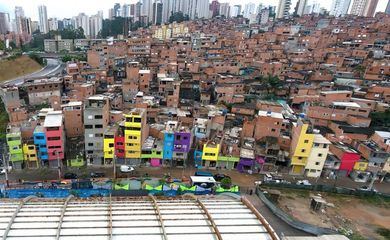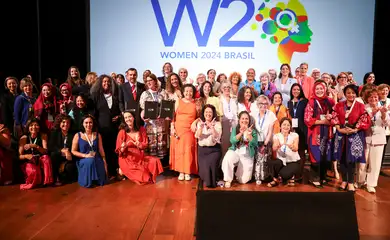Favela representatives draft list of challenges facing G20 countries

Fighting hunger, ensuring access to water, health care, and education, investment in infrastructure, accessible credit, and sustainable development are the demands of the favelas and outlying neighborhoods of Brazil and other countries at the G20, the international forum that brings together representatives from the world’s 19 richest nations, plus the European Union and the African Union.

Those demands are listed on a document entitled Comuniquê, to be unveiled Monday (Nov. 4), National Favela Day, by Favela 20 (F20), a project created by Voz das Comunidades, a socially aware NGO with a journalistic slant run by favela residents.
“One of our main objectives was to include the demands of the favelas and outlying areas not only in Brazil, but also in G20 countries. That was one of our major goals and, as a result, we took part in different conferences and technical sessions of the G20 itself, bringing the urgent demands that are experienced in the Brazilian favelas as well as in those in G20 countries,” said Erley Bispo, co-founder of the F20 in an interview with Agência Brasil.
The document is the result of debates held by six working groups, attended by over 100 organizations from Brazil and the world. Held since July, when the F20 was launched, the discussions cast light on similar situations facing the people in the bloc’s countries. Each working group then drafted a policy brief with a view to proposing the public policies for decision-makers and managers.
Basic emergencies
The document, said Gabriela Santos, co-founder of Voz das Comunidades and the F20, lists more than 15 recommendations. Among the main ones, however, is the creation of a social impact fund for sustainable projects in the favelas. “This line should follow a global alliance against hunger and poverty, focusing on housing, education and entrepreneurship in general. That's one of the points, but there are others in the document.”
Erley Bispo noted that this is the first time an engagement group—F20 Social, as proposed by Brazil in its position of pro tempore president—is brought to G20 discussions.
“An interesting fact is that 1 billion people in the world today live in favelas and outlying areas. According to UN figures, if we don’t plan properly, this number should rise to 3 billion by 2050—and 1 billion is a large percentage of the world's population as it is. We know this will also lead to other social tensions and conflicts. We have this great challenge of inclusion, and make clear the importance of having to tackle these challenges as quickly as possible so we don’t have new wars and other points of global tension. These are points on which we hope to make progress within the G20 itself,” he said.
Expectations
After the document has been handed over, Erley Bispo said, the F20 will observe what recommendations have made it into the bloc’s final proposal.
“We’re using November 4—which is also National Favela Day—as a chance to urge the authorities who will be with us at this launch ceremony representing the G20, the Social G20, Brazilian authorities, and also authorities from the countries that make up the G20, to also sign a commitment to integrate these recommendations into the final document,” he said.




